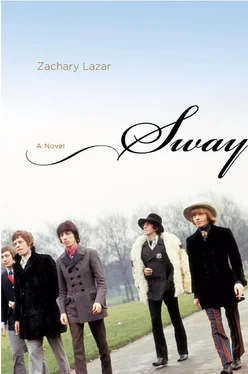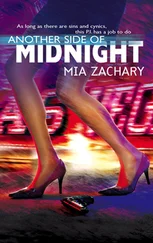That summer — 1963 — they make a first tour of the hinterlands. They follow the old vaudeville circuit through Epping and Slough, Bradford and Spalding, dim ballrooms with spotlit curtains where the last of the big bands still go through their paces. It’s a failure, one failure after another. They come onstage and half the seats are empty and there is too much space to move around in, all that old-fashioned stage to somehow inhabit and use. In London, the crowds had gotten so dense that people fainted from lack of air. The band sometimes had to strip down to their bare chests it was so hot. Now they come on in their street clothes, the way they did in London, and nobody responds. They play seven songs to quiet indifference, then they do the same thing an hour later for a different audience, then they drive somewhere where the tea shop is closed and the petrol station won’t sell them fuel.
It’s hard to remember what they thought they were doing, playing blues to tiny crowds in the Midlands. The ballrooms are damp and cold and they can’t make out the faces in the room, the strange austerity of the spectators. On the wide, empty stages, they move around in some effort even to make themselves seen. They play to forty people in Watford. In Morecambe there are twenty-two. They arrive in provincial high streets, where a few girls wait outside in kerchiefs and plastic pumps, and always there are the stares of the local constables, skeptical faces in a changeless gray drizzle.
The only thing that seems to work is aggression. The sound gets angrier and angrier. In the van afterward, they sometimes turn this aggression on one another.
Keith writes a letter home to his mother:
I thought I’d see the countryside but all I see is the inside of this van. Two weeks now and not a minute to myself. The other night Bill, who’s playing bass, gets into it with the police. They spot him pissing on a wall. There’s a restaurant won’t let us in to use the toilets, so we have to piss outside. Then the cops take each one of us individually behind the building and make us walk a straight line, count backwards from a hundred, pat us down with their hands. Three of them and one of you and it’s dark, some town you never heard of, they’re shining a light on you, none of it makes any sense. Last night Bill pissed himself because we wouldn’t stop the van, just kept jabbing him in the kidneys, telling him it’s a long way back to London and would he like a warm cup of tea?
On the road, Brian sometimes gets his own car. He sometimes even gets his own room at some shabby country hotel while the others sleep in the van. He’s supposed to get to the shows early, settle accounts with the management. That’s the arrangement he’s come to with Andrew Loog Oldham, who has sent them on this futile round of engagements. But something about his privileges, his isolation, along with the shaming drudgery of the tour, has given him a sense of experiencing things from a distance, as if he’s not quite present for what’s really happening. He places his phone calls back to London and counts out the nightly receipts and writes in his book what they’ve spent each day on petrol and food, but there’s often a feeling that somehow it’s coming to an end, that the band is on the verge of failing, no matter what he does.
He’s started to think about the Beatles, to envy their growing fame. There’s the temptation to clean things up, to wear matching suits, and then the realization that it wouldn’t work for them anyway.
One night in Sheffield he arrives almost an hour late for the first show, so drunk he can hardly get inside the backstage door with his briefcase and guitar. He greets the others with a tone of fuzzy dismissal, a complicit blear-eyed shrug, as if the whole thing is just some minor hassle that they should be hip enough to not even notice, much less mention. But then he sees the way Mick is sitting on his dressing room stool, smoking, not looking at him, and it causes him to drop his things to the ground, newly animated, suddenly raising his arms and opening his eyes wide in some strange parody of spookiness.
“What’s wrong?” he says. He walks over and puts his face right in Mick’s, leering at him in a way that Mick has never seen before. It causes him to stare back for a moment in challenge but then to recoil inside himself, realizing that Brian isn’t seeing him.
“What are you so afraid of?” Brian says. “What is it? Are you afraid that I might lose control? That I might bite you, or touch you somewhere dirty? Is that what the long face is about?”
Mick closes his eyes, struggling to compose himself in the small space between himself and Brian. He nods his head then, his eyes heavy-lidded, and lets out a disdainful sniff.
“You’re right,” he says. “We’re all afraid of you, Brian.”
Keith is strapping on his guitar, impatient. “What the fuck are you on about?” he says. “Get your gear on.”
“He looked so displeased just now,” Brian says. “Like this was the whole point, this little gig in fuck knows where. Sheffield. You think you can handle it, Mick?”
He turns back toward Keith, smiling at him in a weirdly complicit way. “Everything he’s ever done, I thought of it a thousand times before. Now he has the nerve to just sit there like that. Like anyone can even see him.”
“Right,” says Keith. “Get yourself together, yeah? You ought to have a look at yourself in the mirror.”
He looks not drunk but fluish. His eyes are gluey and his face is blanched, pink only at the edges of his cheeks. He paces around the dressing room for a few more moments, incredulous and lost. Then he takes his briefcase and his guitar and walks back out the door.
It’s a small crowd, only a few dozen people, but by the third song they’ve all moved close to the stage, standing in the first rows and waiting as if the spectacle before them might collapse. It’s the first time the band has played without Brian, the first time Keith has had to fill up all that space with only one guitar. He moves back and forth toward his microphone stand, raising himself into place for his vocals. For some of his chords, he crouches down by the drum riser, his head lowered almost to his knees. Others he attacks with a sudden upswing of the wrist, a windmilling motion that makes the chords seem like small, controlled detonations. He knows without looking at the crowd that they’re watching him as much as they’re watching Mick. What he’s playing is not quite the blues, and it comes out as if the band is playing it through him, a kind of revenge for Brian’s desertion.
That night Brian has a dream. He’s walking through a courtyard full of rubble — it’s in London, during the war. The courtyard ends in a patch of stubby weed trees, then opens up on a whole city block in ruins: burnt-out cars, sidewalks folded in on themselves, trunks and boxes lying on the ground covered in white dust. What keeps him moving is the sense that he’s being pursued. His pursuer is not quite a person, but like the distorted essence of someone he knows: a middle-aged man with a wrinkled suit who can’t stop smiling. Above them, the sky tilts and veers, invaded at its edges by the branches of trees. The man is stepping through a hallway now, swinging a closed umbrella at his side, grinning. There is a sense of panic before an immense, unending futility. Now they’re in a gray room and the lights surge to an intense white, the walls and ceiling emit a high hum. It sends Brian to the floor, on his back, grasping his knees, paralyzed by the bright exuberance of the man’s gaze. He wakes up with a feeling of intense shame, a sense that whatever happens now will be tainted by the violation of this dream.
Life pivots all at once and suddenly they are stars. One night they come onstage to a hall so full, so crammed with bodies, that they seem on the verge of falling onto the stage. They’re almost all girls — girls with bouffant hairdos and scarves, girls in black jumpers who elbow their way to the front. For a moment, they struggle to find the dials on their guitars; it’s as if they’ve outgrown their bodies and become some quality of the air. The sound the girls make is the strangest they’ve ever heard, not the high screech of adulation but an eerily sexual keen, a thickening moan.
Читать дальше












